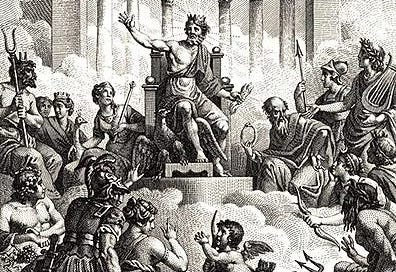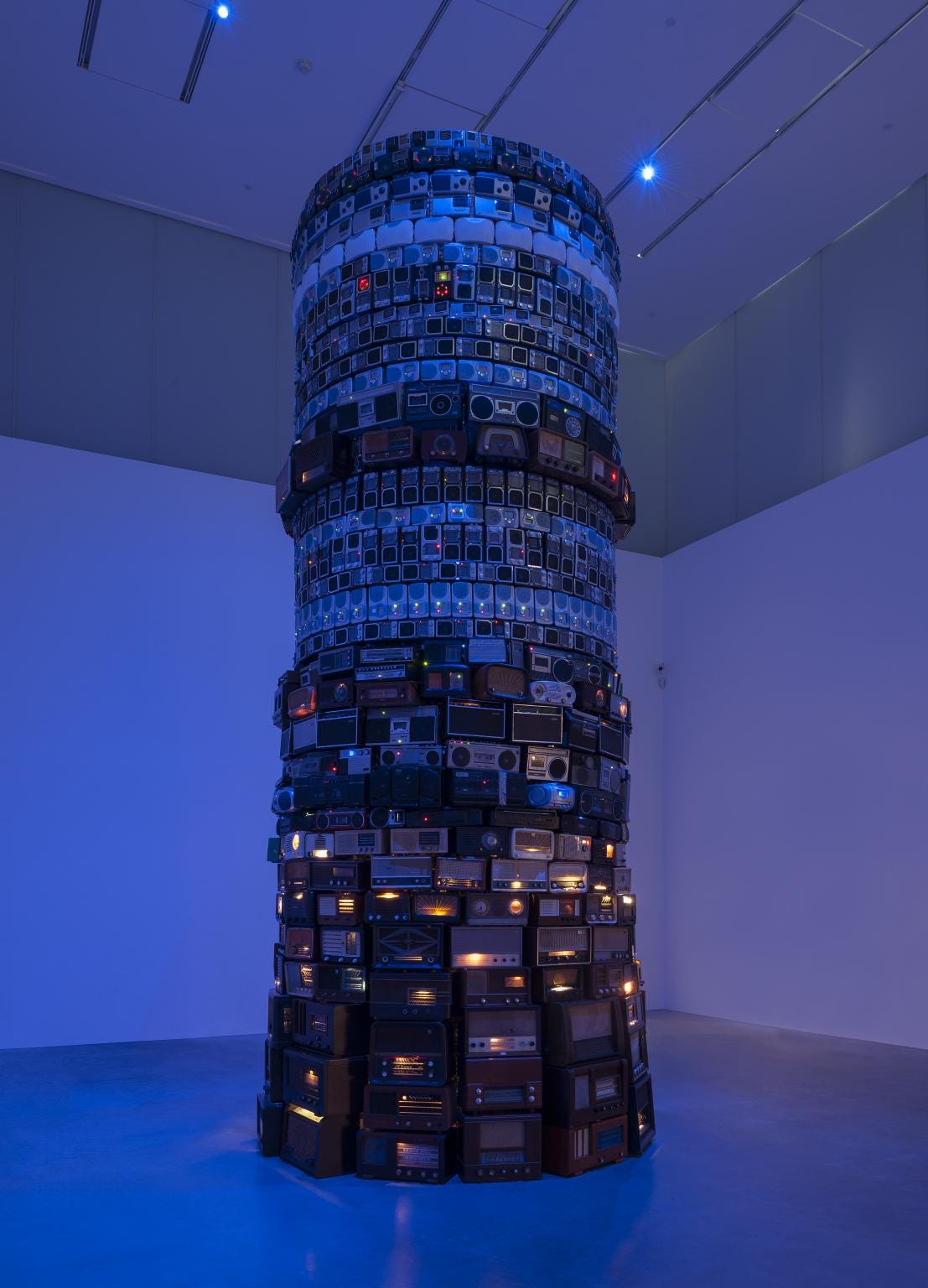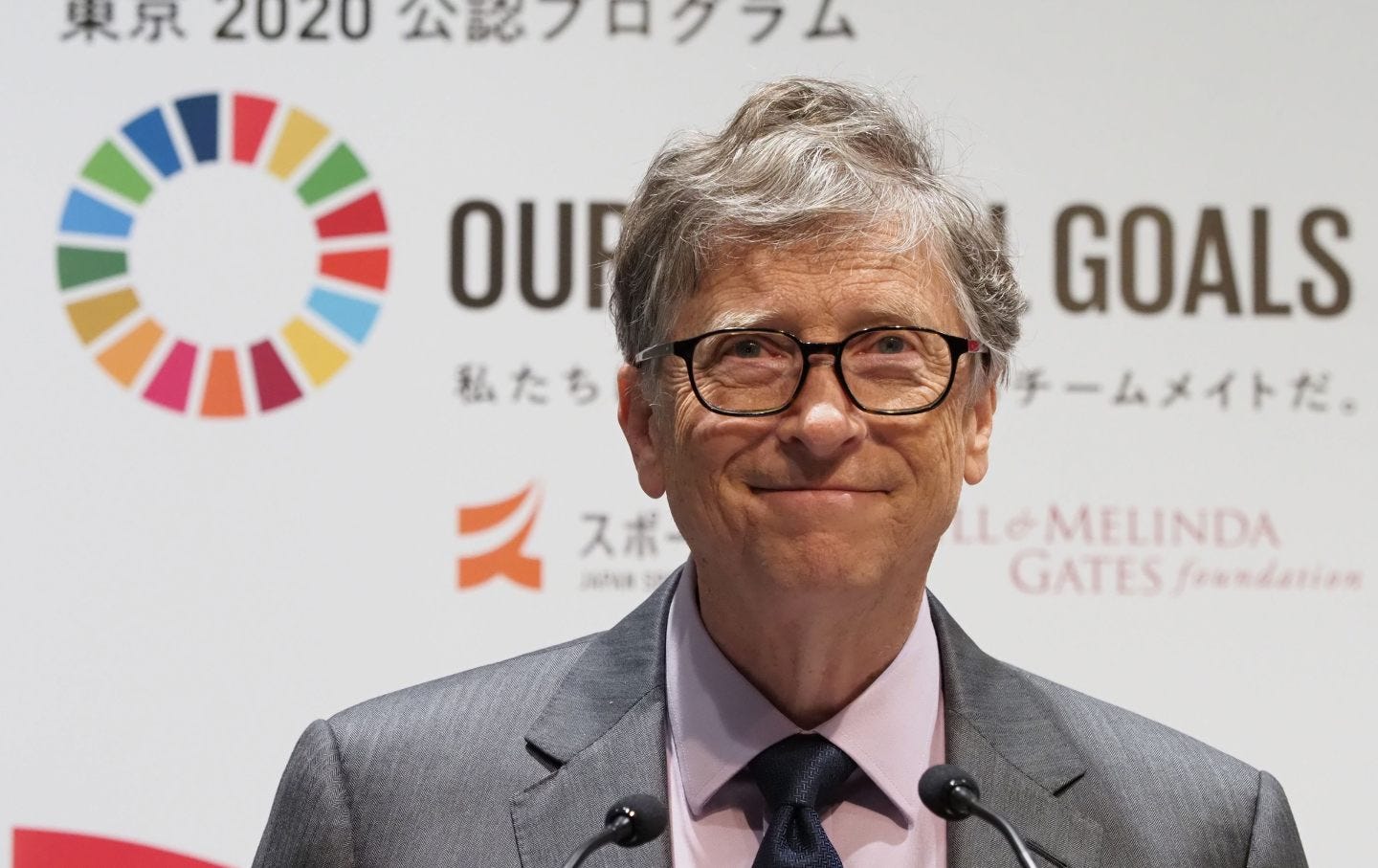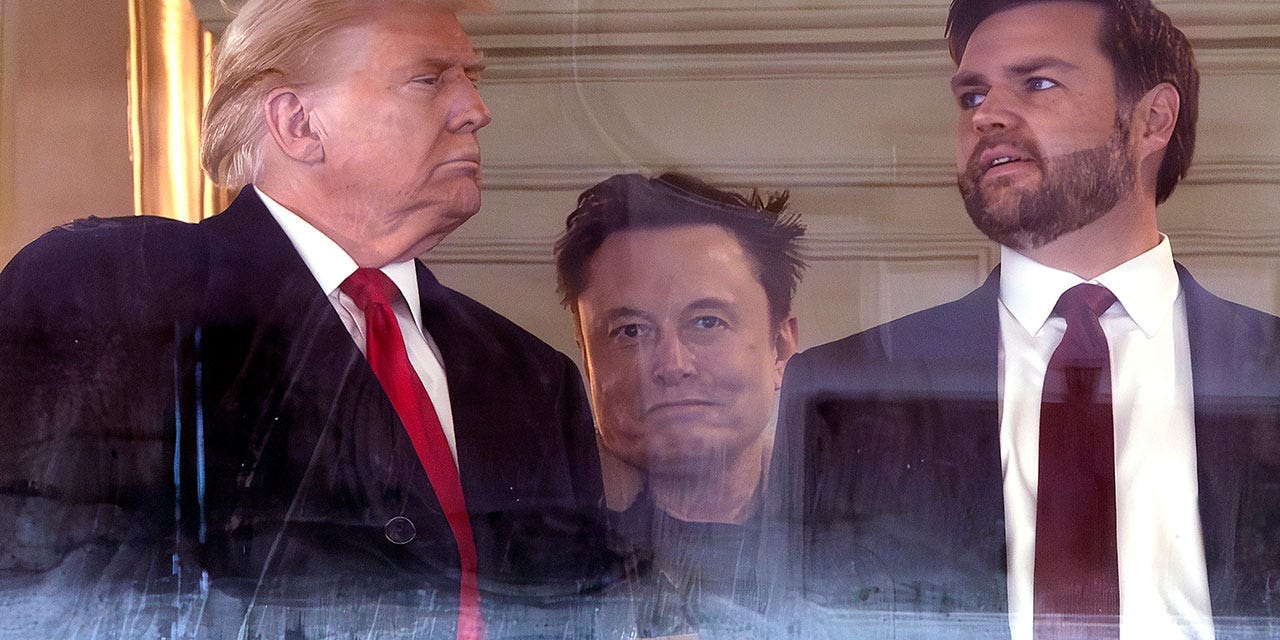The New Olympians: Tech Billionaires and the Myth of Progress
Why Billionaires Dream of Olympus While We’re Left in the Ashes
Slick, I won’t interrupt your reading with obnoxious buttons. If you’d like to support me, you’ll find options here:
Hey, Slick!
What’s the difference between a MAGA nationalist and a tech billionaire?
Good luck telling them apart at a Trump rally; they’re wearing the same hats. But stick around until the end, and it’s easy: one’s heading back to a pickup truck with a stars-and-stripes God Bless America decal, and the other’s slipping into a Cybertruck with an Occupy Mars bumper sticker.
Even The Simpsons didn’t see that one coming; it sounds more like peak South Park. But it’s real, and it’s messy.
MAGA nationalists and tech billionaires have forged an uneasy alliance, united by convenience but divided by vision—and the cracks started showing just days after the election.
Take the clash over H-1B visas: tech billionaires pushed for open borders to fuel innovation and secure talent “for America”, when MAGA nationalists demanded restrictions to protect American workers and sovereignty.
On the surface, their alliance seems improbable: populist movements championing the dignity of the American worker aligning with cosmopolitan elites who dream of automation, open borders, and colonizing Mars.
But beneath the surface… it’s worse.
This isn’t just a matter of policy, but something deeper: a full-on clash of mythologies, a profound divide over what billionaires and nationalists believe progress, power, and the future of humanity (or at least, America) should look like.
On one side, MAGA nationalists frame themselves as sacred defenders of an imagined ethnic homeland, rooted in tradition and committed to sovereignty. Their worldview evokes myths of protection, nostalgia, and the preservation of borders both literal and cultural.
I’ve told you about their mythic revival before, Slick—the sacred defenders, the cosmic battle against globalism, and the myths of rootedness and tradition that drive their politics.
On the other, tech billionaires see themselves as modern-day Olympians, bringing the Promethean fire of progress to humanity. They promise liberation through innovation, offering escape from our limitations—whether through automation, AI, space colonization, or uploading consciousness to the cloud.
This isn’t just a coalition—it’s a collision. And to understand these growing rifts, we have to look beyond the headlines and into the myths of the billionaires themselves: what they tell us, what they hide, and what their vision of progress really means for the rest of us.
The Billionaire Ethos: Olympians Above the Fray
Billionaires don’t just amass wealth—they craft narratives, myths that cast them as Olympians standing above the fray of politics, culture, and even nature. These myths are the scaffolding of their power, shaping not only how they see themselves but also how they want the world to see them.
They frame themselves as modern Prometheans, fire-bringers illuminating humanity’s future with AI, automation, and space exploration. Yet their ambitions burn even brighter: as enlightened elites and architects of salvation, they claim to wield technology as humanity’s deliverance. Their genius and benevolence, they argue, are the keys to reshaping the world—and justify the collateral damage they leave behind.
But for all their lofty promises, the billionaire ethos is riddled with contradictions. Beneath the stories of brilliance and benevolence lies a tale of hubris, disconnection, and destruction. To understand the New Olympians, we must unearth the myths they tell—and confront the truths they obscure.
Prometheus Unbound: The Gift of Fire
At the heart of the billionaire ethos lies the Promethean myth. They are the fire-bringers, wielding the sacred flames of technology to light humanity’s path forward. For them, progress is not merely innovation—it is salvation.
They bring us the Sacred Fire: Technology. Billionaires present their ventures as existential gifts: Bill Gates aims to eradicate global diseases with philanthrocapitalism. Elon Musk dreams of humanity as a “multi-planetary species” just in case he doesn’t solve climate change in time. Mark Zuckerberg promises to connect the world through the Metaverse. These are not just tools—they are framed as acts of global salvation.
They’re modern Prometheuses, heroic outsiders, misunderstood visionaries; when regulators intervene or the public resists, they double down, dismissing critics as shortsighted and incapable of grasping their grand designs.
Because after all, suffering is just the price of progress. Like Prometheus enduring Zeus’s wrath, billionaires view disruption as necessary pain. Industries collapse, jobs disappear, and communities are uprooted, but these sacrifices are rationalized as the cost of moving humanity forward.
But here’s the twist: they’re not stealing fire from the gods—they’re stealing it from us. Tax loopholes, lobbying, and monopolistic practices ensure that the fire they bring serves their interests first, that it’s not they who end up shackled and devoured. It’s less “Prometheus stole fire from Zeus” and more “Jeff moved his fire to Ireland to dodge taxes.”
The Tower of Babel: Building Beyond the Earth
If Prometheus symbolizes the gift of progress, Babel represents the billionaires’ ambition to control the future itself. For the New Olympians, Babel is not a cautionary tale but a blueprint for their empires.
Billionaires aren’t building companies—they’re building towers to the heavens. From Bezos’s orbital colonies to Musk’s Mars plans, their ambitions are always upward. Skyscrapers, satellites, and interplanetary colonies are monuments to their vision of vertical expansion and limitless growth.
Their digital Babels aren’t just physical: platforms like Amazon, Google, and Meta enclose entire populations within ecosystems of their design. The goal isn’t just profit—it’s dominion over commerce, culture, and communication.
Babel’s new builders, like their mythical predecessors, rely on a shared language. They’ve even created their own. There is a code, and they’re the ones writing it: programming languages, AI protocols, and machine learning algorithms that shape reality itself.
In the beginning was the command line1.
But as Babel reminds us, hubris invites collapse. These digital and physical towers rest on exploited labor, ecological damage, and precarious consumer trust—eroded by data breaches, privacy violations, and surveillance scandals. As they climb higher, the ground beneath them cracks.
No problem: they’re flying high in the sky anyway.
Icarus Ascendant: The Glory of Risk
For billionaires, risk is a virtue. Like Icarus soaring too close to the sun, they celebrate ambition and failure as necessary costs of greatness.
The Silicon Valley mantra “fail fast, fail often” reframes failure as a badge of honour. Startups collapse, rockets explode, speculative ventures crash—each failure is positioned as a step toward eventual triumph.
Billionaires focus on what’s next, putting flight before foundations—the next planet, the next breakthrough, the next frontier—but this obsession with ascent leaves those below to deal with the fallout of abandoned platforms, ecological damage, and disrupted communities.
For the Olympians, falling is just another step toward flying higher. For everyone else, the scars of their crashes linger.
The Enlightened Elite: Built Different
There’s a reason billionaires think they can soar too close to the sun without melting their wings. They don’t just see themselves as fire-bringers or empire-builders—they see themselves as a higher order of humanity, uniquely capable of solving the world’s problems.
The Myth of Genius
It’s hard not to fall for the Myth of Genius. The billionaire narrative hinges on stories of extraordinary intellect and drive: Steve Jobs tinkering in a garage, Elon Musk engineering rockets, Mark Zuckerberg coding Facebook in his dorm room. These stories present them as self-made saviours, outsiders who rose to greatness through sheer brilliance.
But as sociologist Pierre Bourdieu reminds us, success rarely emerges in a vacuum. Behind these myths of genius lie inherited wealth, connections, and access. Consider Bill Gates, the dorky outsider whose mom sat on a board with John Opel, then-CEO of IBM2. Or Elon Musk, whose early ventures were fueled by his father’s South African mining wealth. Even Jeff Bezos attended a high school with computers in the 1970s and had a computer at home (an Apple II) long before his peers3.
These origin stories obscure more than they reveal. They reframe privilege as grit, connections as coincidence, and inherited advantages as hard-won genius.
Monks in Mansions
But for all their success and wealth, billionaires would have us think they live like monks—in their mansions. They don’t just position themselves as smarter, but as purer, detached from materialism, and devoted to higher causes. They embrace minimalism, intermittent fasting, and habits that echo monastic simplicity. Mark Zuckerberg famously wore the same gray t-shirt for years, saying:
“I want to clear my life so that I have to make as few decisions as possible about anything except how to best serve this community.”
-Mark Zuckerberg
The reality doesn’t match the myth; their mansions, private jets, and fleets of luxury cars tell a different story. Zuckerberg, the minimalist, rebranded himself with designer suits once the t-shirts outlived their PR value. Bezos, the Amazon ascetic, spent $500 million on a superyacht.
The Silicon Valley Acid Kool-Aid Test
And for all their claims to selflessness, their spiritual pursuits often mask the same hunger for dominance. Psychedelics, for example—tools hailed for dissolving the ego and fostering connection—have paradoxically become part of the billionaire toolkit, amplifying their sense of destiny rather than humility. As Salon notes, the same substances that enlighten some can inflate the egos of others, creating what one writer calls “giant narcissists.” For billionaires, a retreat into ayahuasca or psilocybin often becomes another exercise in self-optimization, reinforcing their self-image as enlightened saviours on a personal journey to shape humanity’s future.
The contradiction is all about preserving their Olympian mystique. They present themselves as philosopher-kings, wise and above the fray, but their detachment from ordinary life exposes their limits. They are far removed from the struggles of the communities they claim to serve.
So, maybe they’re geniuses and sages… maybe just salesmen. The myth of the enlightened elite serves a purpose: it frames billionaires as benevolent technocrats, uniquely qualified to make decisions for the rest of us; as humanity’s last, best hope.
But behind the myth lies an uncomfortable truth: their genius and benevolence are PR constructs, carefully curated to consolidate power. They are not Olympians—they are marketers in expensive suits (or designer shirts) crafting a narrative that justifies their dominance.
And yet, despite their very mortal flaws, they imagine themselves gods on Mount Olympus, gazing down from their towers. Detached from the world they shape, their plans for humanity reveal an unsettling truth: the fire they promise to share is really meant to keep them warm.
Gods on Mount Olympus: The Great Disconnect
For all their claims of progress and salvation, billionaires reveal a profound disconnect from the realities they shape. As their ambitions ascend to Olympian heights, their plans for the rest of humanity grow bleaker.
Let’s be real, Slick—bunkers, private islands, and loyalty chips for guards aren’t exactly how I pictured mankind’s salvation. Yet these are not the fever dreams of dystopian fiction—they’re real, and documented in Douglas Rushkoff’s Survival of the Richest. The technocrats’ “escape pods” aren’t contingency plans—they’re acknowledgments of failure, a recognition of the chaos their systems perpetuate or create.
What’s striking isn’t just their belief in escaping Earth or death—it’s their belief that they’re humanity’s only hope, even as they architect the crises they seek to flee. Their bunkers and escape pods are a symptom of a deeper hubris: they see themselves not as complicit in the collapse but as indispensable stewards of humanity’s survival. This belief absolves them of responsibility for the systems they helped build, allowing them to retreat from the consequences while leaving the rest of us behind to weather the storms. To them, rising above the flames isn’t abandoning the rest of us—it’s fulfilling their divine role.
Even the grave isn’t safe from their hubris. Their bunkers and escape pods aim to outrun a burning Earth; their immortality projects aim to outrun mortality itself. Billionaires want to escape death and, from cryogenics to mind-uploading, their obsession with immortality reveals just how detached they’ve become from humanity’s shared struggles.
These survival strategies, escape plans, and transhumanist fantasies expose the limits of the billionaire ethos. They see the world they’ve helped create—one of systemic inequality, ecological collapse, and fractured societies—and instead of confronting these issues, they double down on the belief that they can rise above them.
The gods of Mount Olympus aren’t looking back down—they’re building higher to escape the flames below.
Progress as Religion: The Virtue Above All
Beneath all these myths lies the ultimate narrative: progress as an unquestionable good. For the New Olympians, progress isn’t just a guiding principle—it’s a religion, one that sanctifies their dominance and justifies their actions.
Progress is beyond question. For billionaires, progress is always forward, always better. It’s more than a belief—it’s a tool for control. By framing themselves as the architects of inevitable progress, billionaires dismiss dissent as regressive and critics as barriers to evolution. In their hands, progress becomes not a collective good but a narrative that justifies their dominance, making opposition feel futile. They rarely ask whether new technologies are desirable—only whether they are possible. Critics are dismissed as Luddites, barriers to an inevitable march toward utopia. To question progress is to question the Olympians’ divine right to lead humanity.
What they’re ultimately selling is salvation. Progress isn’t just a tool; it got re-branded and packaged as full-scale liberation. Renewable energy, automation, and AI are promised as solutions to humanity’s most pressing problems, but for many, progress looks like displacement: jobs replaced by machines, communities uprooted, and ecosystems destroyed.
This belief in progress as inherently good blinds the Olympians to its consequences. The Promethean fire may illuminate, but it also burns—and those burns are felt most by the vulnerable. For all their rhetoric of salvation, the billionaire vision of progress leaves the rest of us grappling with the ashes. And as their myths of ascent burn brighter, they collide with a worldview rooted in nostalgia and preservation.
What happens when Olympian fire meets a movement determined to defend the soil?
The Clash of Mythologies: Olympians and Sacred Defenders
They see themselves as the architects of humanity’s ascent, crafting myths of progress, genius, and salvation to justify their dominance. They claim to liberate us from the constraints of nature, mortality, and even the Earth itself, building a future where technology reigns supreme. But the fire of the new Olympians makes more heat than light.
Even gods need allies. Billionaires may imagine themselves as standing above the fray, but they’ve made an uneasy alliance with a movement rooted in entirely different myths. Where the Olympians dream of transcendence and endless ascent, MAGA nationalists rally around visions of rootedness, preservation, and a return to an imagined golden past.
These mythologies are more than just stories—they shape the systems we live in. While Olympians chase a future of unbounded ascent, nationalists fight to preserve a world they feel slipping away. For the rest of us, caught between these clashing visions, the stakes couldn’t be higher.
These visions could not be more different. Billionaires see the future as a problem to hack; MAGA sees it as something to halt and reset. Olympians promise transcendence through technology, while nationalists vow to preserve an imagined past. Their collision isn’t just political—it’s existential.
So what happens when the gods of Mount Olympus meet the sacred defenders of an ethnic homeland? What happens when progress collides with preservation, and the myths of ascent meet the myths of return? Their alliance may have been forged out of convenience, but it masks deeper, irreconcilable conflicts. And when these two mythologies collide, the consequences will ripple far beyond their chosen battlegrounds—for all of us.
Stay tuned, Slick. This is where the real sparks fly.
Until then,
Stay Slick
The name of an essay by Neal Stephenson arguing free software would eat proprietary OSs… a premice the author had the lucidity to call obsolete five years later
At the time, Microsoft didn’t even have an operating system. Gates purchased one—QDOS—from Seattle Computer Products for $25,000 and turned it into billions.
Source: The Everything Store by Brad Stone.
Thanks Damilya for the link!
At least we can laugh and throw a few good punchlines. If you want more of that, or just to see me one step closer to being a billionaire (only 100,000,000 steps to Olympus)…











